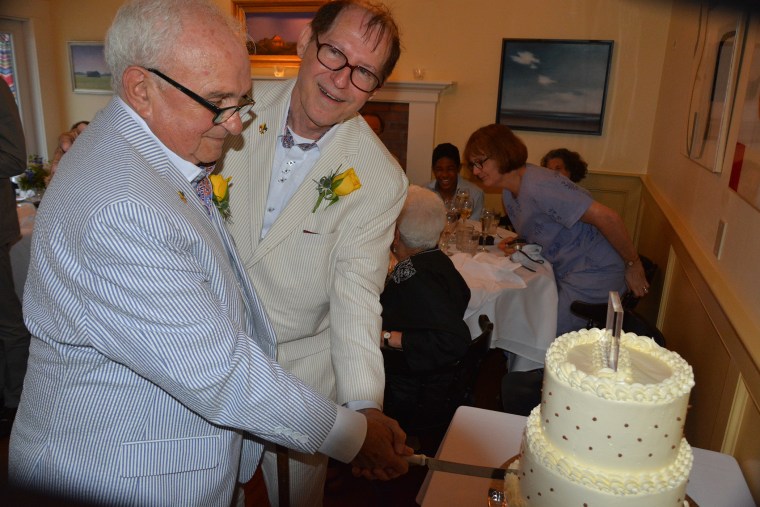Join us in celebrating the first anniversary of the Supreme Court’s decision to strike down the Defense of Marriage Act. To gear up for the June 26 anniversary, msnbc will feature couples’ and individuals’ reflections on the impact the decision has had on their lives and the future of the LGBT rights fight in the United States.
In the last year, marriage equality has come to nine states. Federal judges have also struck down same-sex marriage bans in Idaho, Oklahoma, Virginia, Michigan, Texas, Utah, and Wisconsin, though their decisions are on hold pending appeals.
No ban on same-sex nuptials has survived in federal court since DOMA’s demise. And, as of this month, every remaining ban has been hit with a legal challenge. Both marriage equality advocates, and opponents alike, believe it won’t be long before the issue is once again before the U.S. Supreme Court, and ultimately legalized throughout the nation.
Names: Claude Summers and Ted Pebworth
Date of Wedding: June 27, 2013
After 50 years together, same-sex couple says ‘I do’
Hometown: Baton Rouge, LA
Professions: Retired English Professors
Have you noticed a general shift in attitude toward the LGBT community since the Supreme Court ruling?
"After our wedding we felt more secure with the legal protections marriage offers and we felt an intangible but nevertheless real difference in the way we were perceived by others."'
Yes, we have noticed a shift in attitude toward the LGBT community since the Supreme Court ruling. We live in a very red state (Louisiana) though admittedly in a very blue island (the French Quarter of New Orleans); but even in our backward state, there has been a subtle shift toward greater respect for gay people. For example, the benighted legislature recently refused to repeal the state's unconstitutional sodomy law, but this time the legislators refrained from the harsh rhetoric they have usually employed. Nationally, the trend is stronger and more obvious. It has become clear that the ugliest forms of homophobic expression are no longer socially acceptable.
What are the ways in which the DOMA ruling has fallen short?
The principal way in which the DOMA ruling fell short is that it did not forthrightly declare a right to marry the person of one's choice. The consequence is that those of us who live in states that do not recognize same-sex marriage sometimes feel only "half-married." We are married in the eyes of the federal government, but not in the eyes of our state. People who live in states that ban same-sex marriage, not only must travel to other states in order to marry, but when they return home they face the indignity of their marriage not accorded respect by their state government.
What would you like President Obama and future leaders to prioritize in terms of LGBT rights?
President Obama has been the most supportive president in American history. One of his most important legacies as president will be the progress the country has made in GLBTQ rights during his tenure. I hope that he will issue an executive order requiring that government contractors not discriminate in hiring on the basis of gender identity and sexual orientation. In addition to employment discrimination, services to gay youth need needs to be a priority. Too many GLBTQ youth are homeless and need basic services.
If you were married recently, how has it affected your lives?
Our marriage has affected our lives in ways that surprised us. We got married on our 50th anniversary as a couple, so we knew each other very well, our relationship had weathered good times and bad, and we were regarded by friends and family as an "old married couple." But even so, after our wedding we felt more secure with the legal protections marriage offers and we felt an intangible but nevertheless real difference in the way we were perceived by others, and the way we regarded our relationship. The support we received from friends and family, and the recognition of our relationship by the federal government, spoke to our inclusion in the larger community.
Perhaps most important, being able to marry signified recognition of our equal rights under the law.
What are your hopes and dreams for the next generation or [for your children]?
We hope that succeeding generations can grow up in a society in which the question of whether GLBTQ people have equal rights under the law is no longer a contentious issue. Beyond that, we hope that sexuality itself becomes a less fraught topic and that people are judged by the content of their character rather than on the basis of their sexual orientation and gender identity.
Send us your stories by posting a comment in the msnbc community group on this article.
